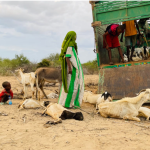Mogadishu (SONNA):Conflict, water shortage, harsh weather will increase humanitarian needs in Horn of Africa country, says UN
More than 83,000 people have been displaced in Somalia due to water shortage since November 2020, the UN Office for the Coordination of Humanitarian Affairs (OCHA) said Friday.
“Coupled with conflict, insecurity and other drivers of crisis, the harsh weather and forecasted below-average rains in some areas will increase humanitarian needs,” OCHA Somalia said on Twitter.
It said humanitarian partners are delivering water to roughly 300,000 affected people in Somalia as the Somalia Humanitarian Fund (SHF), a multi-donor country-based pooled mechanism, is allocating some $13 million for the response to the crisis.
OCHA Somalia added that Mark Lowcock, the under-secretary-general for humanitarian affairs and emergency relief coordinator, “has endorsed up to $7 million for rapid response and up to $20 million for activation of the Anticipatory Action framework.”
On Tuesday, OCHA Somalia said the current political tension will escalate the humanitarian crisis in the Horn of Africa country with over 16 million population.
Somalia witnessed a political stalemate after presidential and parliamentary elections were delayed and the president’s constitutional mandate expired on Feb. 8.
Recent clashes between the government forces and opposition protesters and their security guards claimed the lives of at least four people, including soldiers.
Somali President Mohamed Abdullah Mohamed has called on regional leaders to hold talks to end the political deadlock.
The country has seen about 1.3 million people internally displaced in 2020 alone due to various reasons, including climate-related disasters, especially floods and droughts, according to an earlier statement by OCHA.
Climate change has been markedly felt in Somalia, as well as Chad, and the Africa’s Sahel region.
Rising temperatures and unpredictable rains caused by climate change have also lowered crop yields. Poor communities often face greater exposure to climate hazards.
@AA





